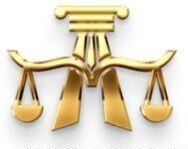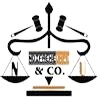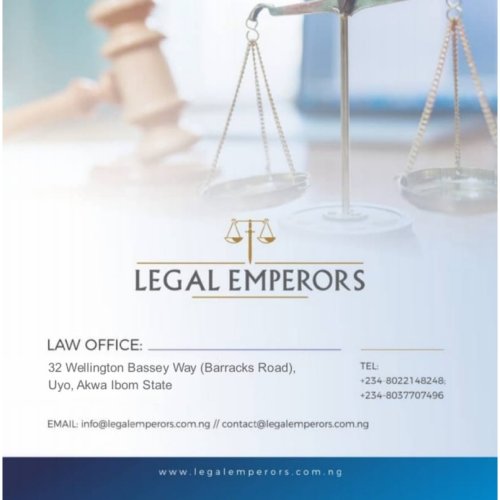Best Sanctions & Export Controls Lawyers in Uyo
Share your needs with us, get contacted by law firms.
Free. Takes 2 min.
List of the best lawyers in Uyo, Nigeria
About Sanctions & Export Controls Law in Uyo, Nigeria
Sanctions and export controls are legal mechanisms used by governments to regulate the flow of goods, services, and technology across borders for reasons such as national security, international obligations, or foreign policy objectives. In Nigeria, and specifically in Uyo, these laws determine how businesses and individuals can trade with foreign entities, and what restrictions apply regarding certain countries, products, or individuals. Compliance with sanctions and export controls is critical as violations can lead to severe legal penalties, disruptions to business operations, and reputational damage.
Why You May Need a Lawyer
Navigating sanctions and export controls is a complex process due to frequently changing laws, regulations, and compliance requirements. Some common situations in Uyo where legal assistance may be needed include:
- Starting a business involving import or export of goods, especially controlled or sensitive products - Doing business with foreign partners, especially those from countries under international sanctions - Receiving government requests or investigations related to export or international banking transactions - Facing accusations of violating sanctions or export controls laws - Seeking advice on licenses and permits for the export or import of certain goods or technology - Structuring supply chains or business operations to avoid inadvertent breaches - Understanding the impact of new sanctions or changes to regulations on your business A lawyer with expertise in sanctions and export control law can help to avoid costly mistakes and ensure full compliance with all local and international requirements.
Local Laws Overview
In Uyo, Nigeria, the main legal frameworks governing sanctions and export controls include national laws, as well as Nigeria's obligations under international treaties and multilateral organizations such as the United Nations and African Union. The Nigerian Export Prohibition Act, Nigerian Customs and Excise Management Act, and Central Bank of Nigeria regulations on foreign transactions are particularly relevant.
Key aspects include: - Prohibition of exporting or importing certain goods without proper authorization - Restrictions on financial transactions with sanctioned countries, entities, or individuals - Mandatory declarations at points of entry and exit - Enforcement of United Nations Security Council sanctions - Requirement for licenses to transfer dual-use items, sensitive technology, or military equipment - Penalties for contravention, including fines, confiscation and imprisonment Understanding which goods, destinations or counterparts are restricted or need licensing is essential for compliance.
Frequently Asked Questions
What are sanctions and export controls?
Sanctions are restrictions imposed by governments to limit trade, financial transactions, or interactions with specific countries, organizations or individuals. Export controls are regulations that govern the transfer of certain goods, technology, or services outside of Nigeria.
Who enforces sanctions and export control laws in Uyo, Nigeria?
Enforcement is primarily carried out by government agencies such as the Central Bank of Nigeria, Nigeria Customs Service, Economic and Financial Crimes Commission, and other federal authorities.
What types of goods are typically controlled in Nigeria?
Items subject to controls may include military equipment, dual-use goods (civilian and military applications), certain chemicals, technology with security applications, and items associated with sustainable development concerns.
Do international sanctions affect businesses in Uyo?
Yes, Nigeria enforces international sanctions and local companies in Uyo must comply with restrictions when doing business with sanctioned countries, entities, or individuals.
What are the penalties for violating sanctions or export controls?
Penalties can include hefty fines, confiscation of goods, loss of export privileges, imprisonment, and reputational harm. The exact penalties depend on the severity and nature of the offense.
How can I find out whether a product requires an export license?
You should consult with the Nigeria Customs Service or legal experts. Lists of controlled goods are often published by the relevant authorities and updated regularly.
Is it necessary to conduct due diligence on foreign clients or partners?
Yes, it is advisable to verify if your foreign partners are subject to any sanctions. Proper due diligence helps prevent inadvertent violations and legal repercussions.
Can sanctions and export controls apply to online services or digital products?
Yes, controls can extend to digital products, software, technology transfers, and online services if they involve restricted destinations or end-users.
What steps should I take if notified of an alleged violation?
Seek immediate legal advice. Respond professionally to authorities and avoid making statements until you consult with a lawyer knowledgeable in sanctions and export controls.
Where can I obtain more information or legal guidance locally?
Contact local legal professionals, government agencies, or specialized consultants familiar with both Nigerian and international sanctions laws.
Additional Resources
For additional assistance, the following resources may be helpful: - Nigeria Customs Service (for licensing, classification, and compliance inquiries) - Central Bank of Nigeria (for financial sanctions and transaction regulations) - Economic and Financial Crimes Commission (for investigation and enforcement matters) - Federal Ministry of Industry, Trade and Investment (for trade policy and strategic goods controls) - Nigerian Bar Association Uyo Branch (for lawyer referrals and professional advice)
Next Steps
If you need legal support navigating sanctions and export controls in Uyo, Nigeria:
- Gather details about your existing or planned international business activities - Make a list of countries, organizations, and products involved in your transactions - Schedule a consultation with a local lawyer experienced in sanctions and export controls - Prepare questions and documents for your lawyer to review - Follow professional advice closely and keep updated with regulatory changes Timely legal advice is crucial for compliance and to avoid disruptions or penalties. If in doubt, consult with trusted professionals before proceeding with any international trade or financial activity.
Lawzana helps you find the best lawyers and law firms in Uyo through a curated and pre-screened list of qualified legal professionals. Our platform offers rankings and detailed profiles of attorneys and law firms, allowing you to compare based on practice areas, including Sanctions & Export Controls, experience, and client feedback.
Each profile includes a description of the firm's areas of practice, client reviews, team members and partners, year of establishment, spoken languages, office locations, contact information, social media presence, and any published articles or resources. Most firms on our platform speak English and are experienced in both local and international legal matters.
Get a quote from top-rated law firms in Uyo, Nigeria — quickly, securely, and without unnecessary hassle.
Disclaimer:
The information provided on this page is for general informational purposes only and does not constitute legal advice. While we strive to ensure the accuracy and relevance of the content, legal information may change over time, and interpretations of the law can vary. You should always consult with a qualified legal professional for advice specific to your situation.
We disclaim all liability for actions taken or not taken based on the content of this page. If you believe any information is incorrect or outdated, please contact us, and we will review and update it where appropriate.











